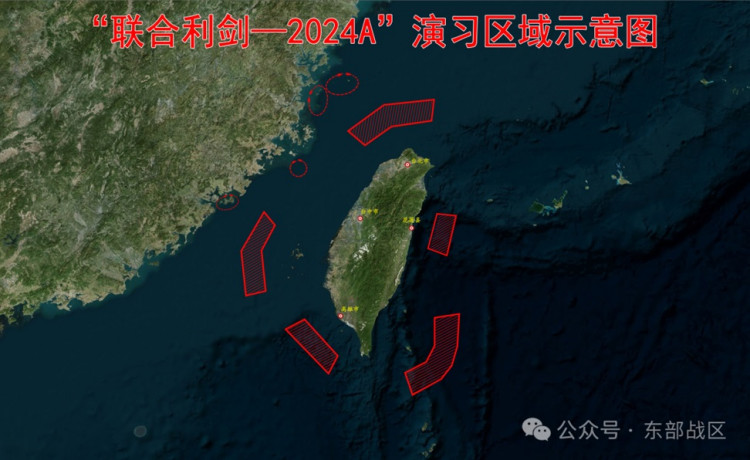China commenced two days of intensive military drills around Taiwan on Thursday, just three days after Lai Ching-te assumed office as Taiwan's new president. The exercises, which Beijing described as "punishment" for "separatist acts," underscore the escalating tensions between China and the democratically governed island.
The drills, conducted by the Eastern Theater Command of the Chinese People's Liberation Army (PLA), began at 7:45 a.m. local time and involve a coordinated show of force by the army, navy, air force, and rocket force. The maneuvers are taking place in the Taiwan Strait, as well as the north, south, and east of Taiwan, and around the Taiwan-controlled islands of Kinmen, Matsu, Wuqiu, and Dongyin.
Taiwan's defense ministry responded promptly, mobilizing its forces and expressing confidence in its ability to protect the island. "The launch of military exercises on this occasion not only does not contribute to the peace and stability of the Taiwan Strait, it also highlights [China's] militaristic mentality," the ministry said in a statement.
The timing of these drills is particularly significant, coming on the heels of President Lai Ching-te's inauguration. Lai, who Beijing views as a staunch "separatist," has repeatedly called for dialogue with China, asserting that only the people of Taiwan have the right to decide their future. In his inaugural speech, Lai urged China to cease its threats, a sentiment that was swiftly condemned by Chinese officials.
Chinese Foreign Minister Wang Yi denounced Lai's remarks, labeling them as "disgraceful" and "betraying the nation and their ancestors." The Chinese Foreign Ministry echoed this sentiment, emphasizing Beijing's unwavering goal of "reunification" and warning that "all Taiwan independence separatists will be nailed to the pillar of shame in history."
The PLA's exercises are designed to demonstrate its joint combat capabilities, focusing on sea-air combat-readiness patrols, precision strikes on key targets, and integrated operations inside and outside the island chain. According to Chinese state media, these drills serve as a stern warning against any interference or provocation by external forces, and a robust punishment for the actions of Taiwan's independence forces.
Chinese state media, including Xinhua and the Global Times, have been vocal in their criticism of Lai's inaugural speech. The Global Times described Lai's address as "vile behavior" filled with "hostility and provocation, lies and deception." This aggressive rhetoric reflects the deep-seated animosity between Beijing and Taipei.
Despite the aggressive posturing from Beijing, there appears to be little alarm among the people of Taiwan, who have grown accustomed to Chinese military activities near their island. However, the historical context and recent escalations ensure that the situation remains tense.
In August 2022, China conducted extensive live-fire exercises around Taiwan following a visit by then-U.S. House Speaker Nancy Pelosi, which Beijing vehemently opposed. Those drills were unprecedented in scale, lasting four days and followed by additional exercises. The current drills, although not as extensive, continue to signal Beijing's readiness to use military force to assert its claims over Taiwan.
President Lai's administration, just days into its term, faces the immediate challenge of navigating these heightened tensions. Lai has maintained a firm stance on Taiwan's sovereignty, emphasizing that the island is a "sovereign and independent nation with sovereignty resting in the people." He has called for peace and stability in the Taiwan Strait but has also made it clear that Taiwan will make no concessions on its democracy and freedoms.






